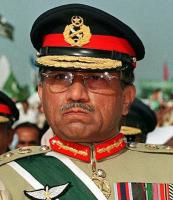
The imposition of emergency rule in Pakistan last Saturday comes as no surprise to onlookers who have witnessed Musharraf's grip on power ebb away over the past few months.
Clearly suspecting that his recent re-election by the National Assembly last month while holding both the offices of President and Chief of Army Staff may have been ruled illegal by the Supreme Court, Musharraf imposed de facto martial law in a desperate bid to retain
power.
Musharraf also stated that he imposed emergency rule in order to prevent Pakistan from "committing suicide." Yet the truth is that after 8 years of supreme power, Musharraf has, by his own discription, brought Pakistan to its knees. By siding with the US in its War on Terror, Musharraf has polarised Pakistani society and weakened her strategically within the region. His unpopular policies of secularising the country, undermining the resistance in Kashmir, and setting the army upon the citizens of Waziristan and the Northern regions have caused divisions at every level of Pakistani society including within the army. Indeed, his inability to allow political expression by opposition groups or criticism of his policies by the judiciary has left him deeply unpopular and weakened. Ironically, Musharraf's suspension of the constitution, replacement the nation's chief judge and blacking out the independent media that refused to support him will only generate an environment that will foster greater support for militancy.
The imposition of a state of emergency is a last ditch attempt by Musharraf to cling on to power. Even after the desperate intervention of his close allies of the US and UK governments to save his regime by securing a marriage of convenience with the disgraced former Prime Minister Benazir Bhutto, Musharraf's position has proven to be untenable. Clearly the deep concern expressed by the US and UK governments at the imposition of emergency rule is not that democracy has been further set back in Pakistan but rather that Musharraf's decision is likely to constitute the point of no return for his ailing premiership. Indeed, the mute responses from the US and UK governments indicate that they realise their loyal partner in their war on Islam was left with few options other than to stage another coup d'etat.
The Muslims of Pakistan can no longer allow the current cycle of failure to continue and must now take the opportunity to bring about not only a change of leadership but a change of system. The Khilafat system is the only hope remaining for Pakistan to bring about a national reconciliation in which the desire for Islam, representative governance and the respect for the rule of law are combined within a political system that unifies the people upon the basis upon which Pakistan was created-Islam. Furthermore, only the Khilafat system can rid Pakistan of the plaque of western interference which has played a key part in the failed politics of the past 60 years and bring about a true era of independence.
